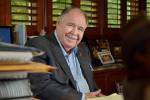Musicians union president hopes to conduct with more harmony
Vegas Voices is a weekly question-and-answer series featuring notable Las Vegans.
Pressure? Jack Gaughan's seen his share.
He was one of the conductors for "The Phantom of the Opera" when it came to New York in early 1988 as one of the most-anticipated productions in Broadway history.
Then there was the time the "Phantom" stars made the road trip to the White House to perform for President George H.W. Bush and the president of South Korea.
Afternoon rehearsals were interrupted by famous first dog Millie, then by first lady Barbara, then by the president himself, who took a few minutes to chat.
"He was actually very friendly and very warm. I never thought he came across on television as very warm," Gaughan recalls.
But last month, the veteran conductor and orchestral contractor stepped into a different pressure cooker when he was elected president of the Las Vegas Musicians Union, Local 369.
Gaughan ran unopposed after an upheaval in which the parent union, the American Federations of Musicians, concluded longtime president Frank Leone mishandled a contract negotiation. The AFM later declared Leone inelegible to run for re-election and took temporary trusteeship of the local and its 600-plus members in October.
Before Gaughan took office in January, he conducted the casino editions of "Chicago," which brought him to town in 1999, and The Venetian's version of "Phantom." He took some time last week to share a bit of his past and plans for the union to move forward.
Review-Journal: So what year did you get your AFM card?
Gaughan: It was 1977, a couple of years after I got to New York. I was doing a lot of coaching and some of the people I was coaching were on 'All My Children.' They were going to do a musical segment on the show and they asked me to play, but I had to join the union. That opened up a whole other world of opportunities.
R-J: Was music always your whole life?
Gaughan: I don't remember a day in my life I didn't play the piano. I probably played the piano before I spoke English.
But I actually thought I was going to go to med school. I went to University of Virginia for two years as a pre-med student and I got bored. The problem was my last two years of high school, they sent me across the street to college to do all my math and science, so I was doing all that stuff all over again.
Meanwhile, I was playing music in the orchestra and everywhere I could so I said, 'I'm gonna give in and go to music school.' If that hadn't happened, I might have had a different life.
R-J: How did you end up in New York?
Gaughan: I had no idea what I was going to do once I got to New York, but I thought if I was going to do anything, that was the place to do it — as the song says.
I drove my U-Haul trailer truck from Virginia to New York City, where I knew one person, a college friend of mine. As I'm unloading the truck and getting the (baby grand) piano off the truck, two guys come running down the street: 'We have an audition tomorrow, can you play for us?'
I went with them to the audition and they both got the job, so they recommended me to other people and that's how it all started.
R-J: What made you run for president, an office some would argue no sane person would volunteer for?
Gaughan: Why is everybody saying that to me? (Laughs).
It actually had a long evolution. In an organization that large, there are always going to be people who are disgruntled about one thing or another. You just can't get around it. On several occasions, people asked me if I would run. I really just didn't want to do it. I guess I had too many other things to do ... at that point I was doing a lot of contracting.
This time, a lot of people convinced me they thought I had something to offer the union. I decided to run, if nothing else, just to open up a debate with the former administration and with the membership themselves. There had been so many elections where there was only one person running for each office.
The experience (of running unopposed and winning by default) didn't turn out the way I hoped it would, but I think I probably do have a lot to bring to the table. It's a little odd because Frank Leone and I have always gotten along ... this has been a kind of strange experience in that sense.
R-J: If the union hadn't had all the internal upheaval, my questions would all be about how do you increase membership or get more work on the Strip. But is it more important to get things healed in-house first?
Gaughan: I think the organization is going to be stronger if we get our own house in order in the most compassionate and constructive way we can do that. I think that takes work when you change administrations, even if there hadn't been the uproar and everything turned upside down.
My feeling about is that it was up to me to set the tone. I've tried to set a tone that is open and supportive with the lines of communication open if people want to take advantage of it ... . I think for a lot of the older generation of our members who don't know me, the jury is still out, and that's fine. I wouldn't expect that to be any other way. I hope they would come in and make themselves acquainted and find out what is going on. I think it will just take time.
R-J: What kind of growth opportunities are out there?
Gaughan: We're trying to ascertain that. It's a whole different atmosphere from when I first came, because the big shows are not coming in.
R-J: Can you be proactive and try to get more TV specials and concerts, or do you have to wait for a promoter to book them?
Gaughan: I would say most of the time if you've waited for them to come to you, you've waited too long. You need to get into the game before that happens.
There's a show in New York I think would be a fantastic fit for Las Vegas. We're going to send an emissary to them and say, 'We have the resources you need to bring it in. Let us help you, let us work with you.' That's the kind of thing I would like to achieve.
There's a way of being proactive about it which you can do without them feeling like, 'Oh God, here comes the musicians union.' ... I'm trying to make the face of our union appear to be more user-friendly. Because people think in their head, 'Oh the unions are more expensive, tougher, have all these rules, rules, rules.'
We do have rules, but the point of the rules is to make the music you get at the end of it better. It's not punitive.
R-J: The old perception that when some big name like Andrea Bocelli comes in with a full orchestra, the union is going to soak them for a big payday.
Gaughan: I think the whole idea that the union's out to soak somebody is an old-fashioned, misrepresented idea. In New York, they used to have to hire a minimum number of musicians whether they were playing or not. They've seen the light of day about that. We're not going to get anywhere that way. It's old-fashioned feather-bedding which doesn't work any longer. Everybody's come to a more realistic point and I think that's probably a good thing.
It's like anything else, it's a competitive exercise. But we have the resources and the talent to compete on a very high level. That part is not really an issue. I've been on tour where I've gone to a city with a union band, and you listen to them play and go, 'Really?' Never happens in Las Vegas.
— Read more from Mike Weatherford at reviewjournal.com. Contact him at mweatherford@reviewjournal.com and follow @Mikeweatherford on Twitter.





























